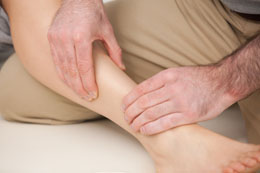Aching legs when lying down is a common problem that affects most people across the world, especially the elderly.

Aching legs, as I said, is a common issue with most people, especially older adults. Sports, recreational activities, work in office or around the home, traveling, etc., are some common causes of leg pain. The problem usually refers to a pain that occurs somewhere between the pelvis and heels. In some cases, lower back pain and aching legs may be related to each other, because the pain in the back might get radiated to the legs of the person. Some people may have aching legs when lying down suddenly, while some develop the problem gradually. The pain can be dull, sharp, stabbing, tingling, or it might even be a throbbing leg pain.
Causes of Aching Legs
As I have mentioned, aching legs is common with older adults. With age, muscle mass diminishes, giving rise to fatigue and aching legs. Apart from the physical factors mentioned above, there are certain medical conditions that may cause this condition. These include
- Achilles tendinitis
- ACL injury
- Blood clot (thrombophlebitis)
- Bone cancer
- Broken leg
- Bursitis of the knee (usually a cause of leg pain behind knee)
- Deep vein thrombosis (DVT)
- Fibromyalgia
- Gout
- Hamstring injury
- Herniated disk
- Leg cramps at night
- Muscle cramp
- Osteoarthritis
- Peripheral neuropathy
- Phlebitis inflammation
- Plantar fasciitis
- Posterior cruciate ligament injury
- Posterior tibial tendon rupture
- Rheumatoid arthritis
- Sciatica
- Shin splints
- Sprains and strains
- Stress fractures
- Tendinitis
- Torn meniscus
- Transient ischemic attack (TIA)
- Varicose veins
These conditions are usually the causes of chronic leg pain. Now let us see what could be done to deal with the condition.
How to Relieve Aching Legs
- Fill a large container with hot water, and add 2 teaspoons of Epsom salt to it. Dip your legs in the water for 15-20 minutes. As the salt is rich in magnesium, it helps in reducing the leg pain at night. Do this before going to bed if your legs ache frequently at night while sleeping.
- Leg massage using coconut or mustard oil has always been an effective remedy for dealing with legs and feet.
- Another stuff to massage with is a mixture of camphor oil (10 g) and mustard oil (200 g). Place the mix under the sun, to help the camphor melt. Thereafter, give a massage to your legs for a good 15 - 20 minutes. The massage works well if you have someone else to do it for you.
- A proper posture is also necessary to reduce leg pain. While standing, ensure that your weight is evenly balanced on both feet. Improper footwear is also one of the main causes of leg pain in many people. Ensure that the shoes you are wearing provide enough cushion, and a proper fit to your legs. Loose shoe wear causes the feet to twist and turn in an improper manner, leading to inflammation and pain. Also a flat pair of shoes is recommended over high heels.
- Soak a washcloth in warm water and place it on the aching leg for sometime. Repeat with the other leg.
- Avoid activities that aggravate the pain, but do not go completely immobile. Consult your physician about exercises which can reduce the pain and improve flexibility.
- Diet is also something to be looked after in order to manage aching legs. Doctors recommend eating 5-6 walnuts every morning, with water. Also adding cod liver oil to salads and other food items also provide a great deal of help in treating the condition of aching legs. Moreover, it would also help in healing general weakness in the body.
- One last tip on reducing leg pain is to drink a glass of water mixed with dried fenugreek seeds every morning, on an empty stomach. The seeds may sure look humble, but they have been known to do wonders in curing pain.
The above home remedies work well for aching legs, if the causes of the condition are mild. However, if the problem has some underlying medical condition behind it, then treating it might be the only way to deal with the pain. So if you see that the remedies are not helping, see your doctor as soon as possible.


 Aching legs, as I said, is a common issue with most people, especially older adults. Sports, recreational activities, work in office or around the home, traveling, etc., are some common causes of leg pain. The problem usually refers to a pain that occurs somewhere between the pelvis and heels. In some cases, lower back pain and aching legs may be related to each other, because the pain in the back might get radiated to the legs of the person. Some people may have aching legs when lying down suddenly, while some develop the problem gradually. The pain can be dull, sharp, stabbing, tingling, or it might even be a throbbing leg pain.
Aching legs, as I said, is a common issue with most people, especially older adults. Sports, recreational activities, work in office or around the home, traveling, etc., are some common causes of leg pain. The problem usually refers to a pain that occurs somewhere between the pelvis and heels. In some cases, lower back pain and aching legs may be related to each other, because the pain in the back might get radiated to the legs of the person. Some people may have aching legs when lying down suddenly, while some develop the problem gradually. The pain can be dull, sharp, stabbing, tingling, or it might even be a throbbing leg pain.